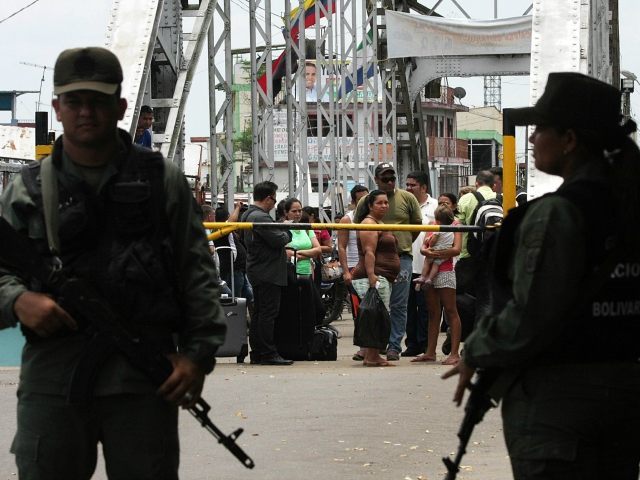Venezuelan President Nicolás Maduro has shut down the border between his nation and Colombia in Apure state, the third state affected by a deportation spree that has sent 20,000 Colombians fleeing home, fearing for their lives and property.
Maduro first announced that he would implement a state of emergency in municipalities in Apure, following border closures in Táchira and Zulia states. Maduro has insisted extreme measures are necessary to stop an ongoing “economic war” Colombia is allegedly waging with Venezuela, in which Colombians trade difficult-to-find basic goods to Venezuelans for their oil. Venezuelan newspaper El Universal is calling the state of emergency a full “closure” of the border in Apure state, enacted abruptly and leaving many stranded in the wrong country, as the border between the two nations is typically porous and crossed for business routinely by many of both countries.
Maduro began ordering the deportation of Colombian nationals living in Táchira state in late August, claiming Colombian “paramilitaries” were waging “economic war” on his country. So far, 20,000 Colombians have been caught in the mass deportations–nearly 2,000 removed from their homes and families without due process, their homes marked with a “D” for “demolition” once they are removed. Colombian President Juan Manuel Santos has accused the socialist Venezuelan head of state of using “Nazi ghetto tactics” to expel Colombians, and authorities have reported multiple cases of men, women, and children accusing Venezuelan soldiers of sexually assaulting them.
Colombia has responded to the deportations by shutting down import and export activity in the border towns most affected by the shutdown: San Antonio and Paraguachón, the latter of which Santos visited personally this week. Local Venezuelan officials are railing against the measure, arguing that their cities are already suffering severe shortages due to socialist ration impositions and that cutting off their supplies from Colombia will be devastating.
“The measure exacerbates even more the product shortages that affect our population,” said Apure Chamber of Commerce President Vito Vinceslao. “We already have a 70% shortage in medicine and pharmaceuticals. … 75% shortages in hygiene products, and we all know about shortages in basic foods.”
After weeks of public disagreement, the presidents of Venezuela and Colombia will meet on Monday in Quito, Ecuador, accompanied by Ecuadorian head of state Rafael Correa and Uruguayan President Tabaré Vásquez as mediators. “We have finally achieved planning a ‘face to face’ [said in English] meeting between Santos and Maduro,” Maduro said on live television on Thursday. “There I will be, shaking hands with Santos and sitting down to have a deep talk on all the topics on the agenda to construct a new peace border,” he explained.
While the presidents debate the border issue, Colombian cities flooded with returned citizens struggle to provide for them as they resettle and find work. In the city of Manizales, a group of expelled Colombians demanded basic humanitarian aid while they find work. “We are not asking to be provided for,” said one woman standing in front of City Hall. “We just want humanitarian aid for at least three months while we find work.”

COMMENTS
Please let us know if you're having issues with commenting.